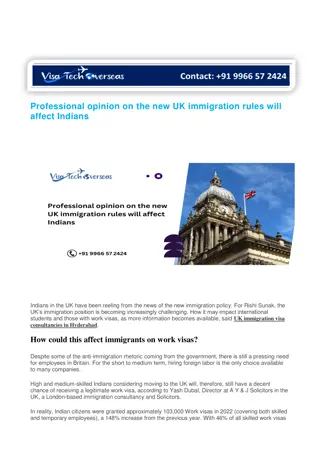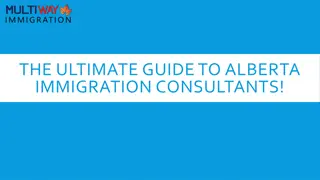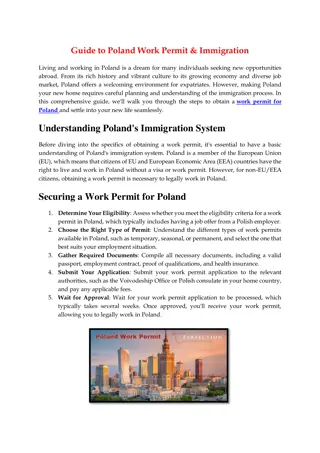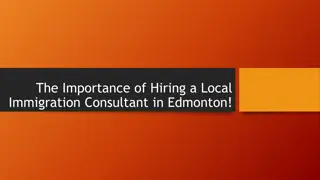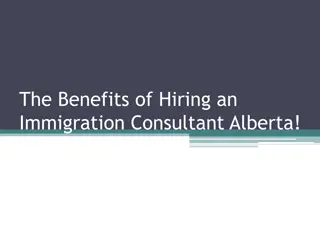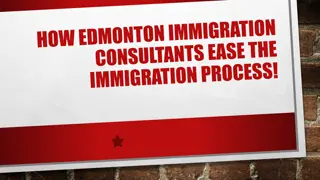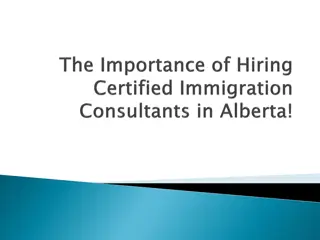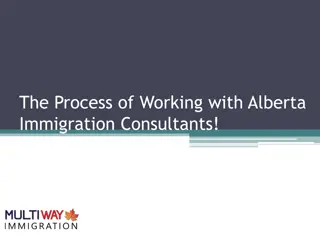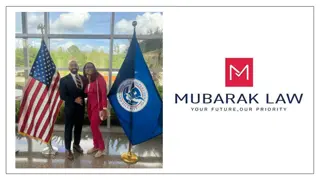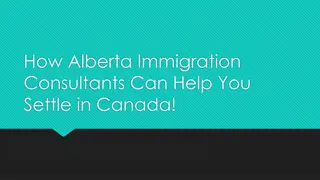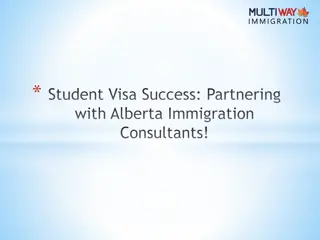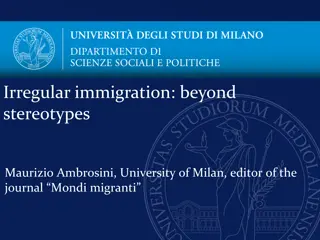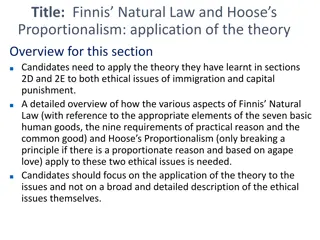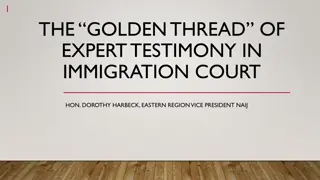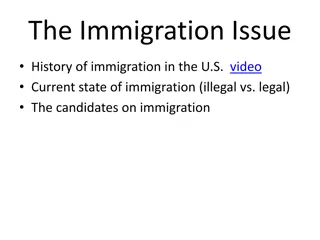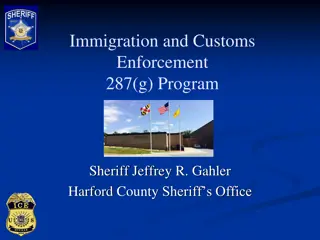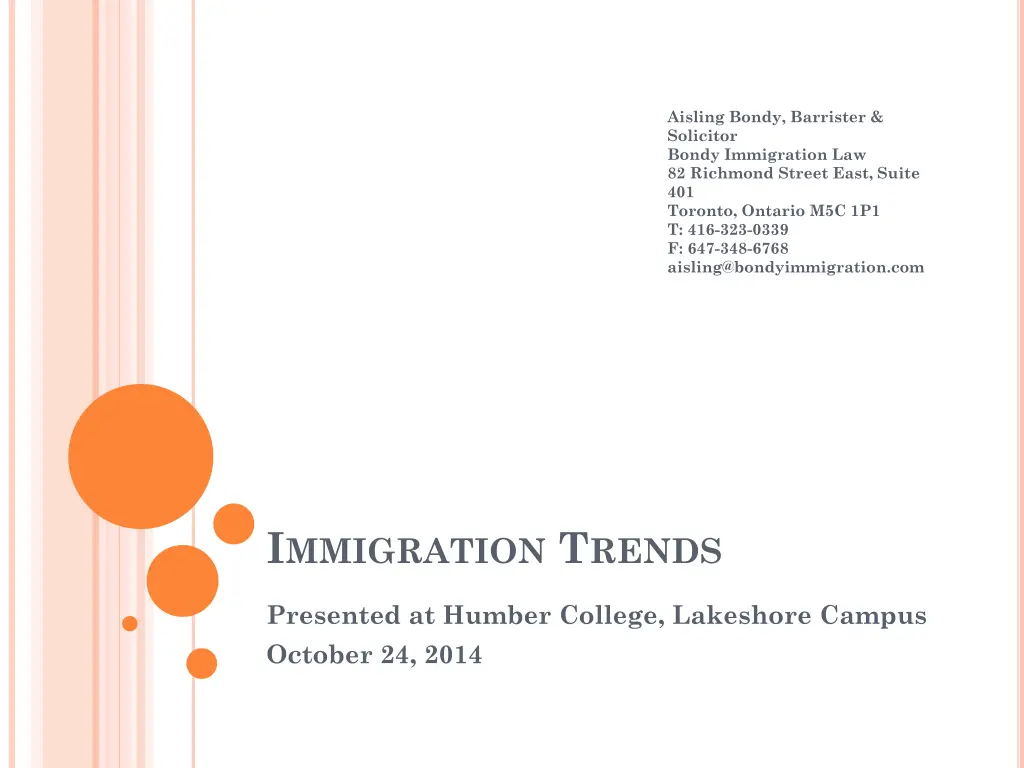
Understanding Current Immigration Trends in Canada
Explore the evolving landscape of immigration in Canada through a comprehensive overview of changing requirements, treatment of refugee claimants, opportunities for students and foreign workers, and more. Stay informed on crucial updates impacting individuals seeking immigration solutions in Canada.
Download Presentation

Please find below an Image/Link to download the presentation.
The content on the website is provided AS IS for your information and personal use only. It may not be sold, licensed, or shared on other websites without obtaining consent from the author. If you encounter any issues during the download, it is possible that the publisher has removed the file from their server.
You are allowed to download the files provided on this website for personal or commercial use, subject to the condition that they are used lawfully. All files are the property of their respective owners.
The content on the website is provided AS IS for your information and personal use only. It may not be sold, licensed, or shared on other websites without obtaining consent from the author.
E N D
Presentation Transcript
Aisling Bondy, Barrister & Solicitor Bondy Immigration Law 82 Richmond Street East, Suite 401 Toronto, Ontario M5C 1P1 T: 416-323-0339 F: 647-348-6768 aisling@bondyimmigration.com IMMIGRATION TRENDS Presented at Humber College, Lakeshore Campus October 24, 2014
CHANGING IMMIGRATION REQUIREMENTS
ALREADY REVIEWEDIN PREVIOUS PRESENTATION Citizenship Family Class
REFUGEE CLAIMANTS Claimants treated differently based on country of origin ( designated country of origin or DCO list) Faster processing times Access to Refugee Appeal Division for some claimants Limited access to Humanitarian and Compassionate Applications and Pre-Removal Risk Assessments for failed claimants
REFUGEE CLAIMANTS(CONTD) Claimants from countries DCO list can be deported while their Application for Leave and for Judicial Review of refused refugee decision is pending before the Federal Court Limited access to health care Limited access to work permits for claimants from DCOs Bill currently before Parliament allowing provinces to limit access to social assistance
STUDENTS Most (but not all!) international students can work without a permit while they are studying Post-Graduate Work Permits for students once they graduate Graduating from program in Canada can facilitate an application for permanent residence; some examples: Ontario Provincial Nominee Program for graduates from masters and PhD programs FSW program for PhD students Post-Graduate Work Permits facilitates obtaining work experience required for Canadian Experience Class
FOREIGN WORKERS More difficult to obtain a Labour Market Impact Assessment (LMIA) in order to obtain a work permit Can impact those who are already in Canada on an open work permit and need an LMIA in order to remain in Canada Four year limit on some types of work permits Expansion of number of work permits granted under the International Experience Class (work permits granted under international agreements), especially to youth of certain nationalities
INADMISSIBLEPEOPLE Limited venues for remedying inadmissibility No H&C applications for certain types of inadmissibilities Ministerial Relief applications limited in scope (can only consider national security and public safety considerations , no other factors, such as H&C or Best Interest of the Child factors) More complex procedure for obtaining pardon for criminality in Canada
PERMANENT RESIDENTS Limited access to the Immigration Appeal Division for permanent residents who are found to be inadmissible due to serious criminality
ECONOMIC CLASSESOF IMMIGRATION Current categories Federal Skilled Worker Federal Skilled Trades Canadian Experience Class Provincial Nominee Programs
ECONOMIC CLASSESOF IMMIGRATION (CONT D) Express Entry Applicant files an expression of interest online with their personal profile Applicant will be given a human capital score based on their personal profile, and then ranked against other applicants based on that score Applicants with a job offer or provincial nomination will be given sufficient points that they will be ranked highest Every two weeks, CIC will select the highest ranking applicants and invite them to apply ( invitation to apply ) Applicants will have 60 days to file an application for permanent residence under one of the existing categories (i.e. FSW, FST, CEC, or PNP) after receiving an invitation to apply
ECONOMIC CLASSESOF IMMIGRATION (CONT D) General trends in Economic Class Requirements Increased requirement for English / French language skills, and for most types of applications official English / French language testing is required Increased requirement for work experience in Canada or job offer in Canada Favouring applicants with experience in certain occupations based on Canadian labour needs
HYPOTHESIZINGABOUT FUTURE IMMIGRATION TRENDS
HYPOTHESIZINGABOUT FUTURE IMMIGRATION TRENDS Increasingly vulnerable refugee claimants Less access to social supports (ex. access to health care, work permits, social assistance) Less access to alternative means to remain in Canada if claim refused Persons in Canada who cannot obtain permanent residence due to inadmissibilities that cannot be resolved
HYPOTHESIZINGABOUT FUTURE IMMIGRATION TRENDS(CONT D) Some foreign workers with jobs but who are unable to extend work permits or obtain permanent residence (due to four year restriction on work permits and increased language requirements for economic PR classes) Youth on open work permits under the International Experience Class Students coming to Canada to study for the sole purpose of obtaining permanent residence Newcomers under the economic classes are more likely to already have work and strong English skills
HYPOTHESIZINGABOUT FUTURE IMMIGRATION TRENDS(CONT D) Easier to lose Permanent Residence once acquired Conditional Permanent Residence for family class Less access to the IAD for PRs who are convicted of crimes More difficult to obtain citizenship (English requirements, residency requirements, etc.) Increased powers to revoke citizenship




